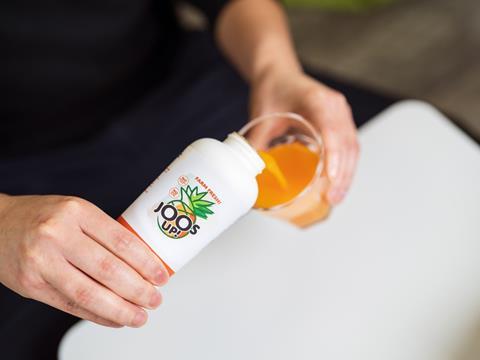
PA Consulting and PulPac have launched the Bottle Collective, which intends to create a fibre-based alternative to plastic bottles for use in the food, drink, consumer health, and FMCG industries.
Making use of PulPac’s Dry Molded Fiber and PA Consulting’s mechanical engineering, design, automation, and material sciences teams, the Bottle Collective aims to provide a recyclable, high-speed, and low-cost solution to single-use and commodity plastic bottles. Initial prototypes have already been developed, the companies report.
The patented Dry Molded Fiber manufacturing process produces fibre-based packaging from renewable pulp and cellulose resources. It is thought to use less CO2 than both the manufacture of plastic and traditional wet moulding options, as well as almost no water.
Each bottle can also be modified in shape, size, and decoration capability to produce a bespoke bottle for specific brands. Water, dairy products, non-carbonated soft drinks, alcoholic beverages, detergent, skin care, and hair care are amongst the expected applications for the fibre-based solution.
Furthermore, multiple leading brand partners are said to have joined the Collective with their sights set on developing and scaling fibre bottles by 2025.
“We are thrilled to announce the Bottle Collective,” said Tony Perrotta, PulPac Partnership lead at PA Consulting. “Together with leading global consumer brand partners, we can fast-track the development of the world’s first Dry Molded Fiber bottle. This will make the most of our renewable resources while delivering significant positive impact to reduce today’s single use plastic pollution.
“We have the technology. We have a functioning prototype and process. We are now ready to enter the next stage - demonstration that our Dry Molded Fiber bottles are capable of being produced at the speed, volume, and cost necessary to match the massive scale of this global industry challenge.”
Sanna Fager, chief commercial officer at PulPac, continued: “Plastic bottles are the holy grail of plastic replacement. They have an estimated annual production volume of up to 500 billion pieces and are a significant source of plastic pollution worldwide.
“We are proud to share some of our patent-protected advances with PA Consulting, combining Dry Molded Fibers’ forming versatility, broad barrier applicability, and high production efficiency. Backed by strong partnerships across the value chain, we can bring competitive unit cost into the fiber-bottle space, enabling the shift away from today’s single use plastic. We encourage all brands and relevant industry actors to join this force for sustainable change.”
The news comes after the foundation of PA Consulting and PulPac’s Blister Pack Collective, which seeks to apply Dry Molded Fiber technology to the pharma, consumer health, and FMCG industries.
SustainaPac has also joined PulPac’s licensee network and plans to use Dry Molded Fiber to produce single-use food service packaging products for the quick service restaurant market in North America.
Last year saw Cullen Packaging unveil a moulded fibre bottle to package such dry goods as curry powder and fabric softener, and SUPA claimed to have achieved a world first in the production of a plastic-free paper bottle for laundry and washing up liquids.














No comments yet